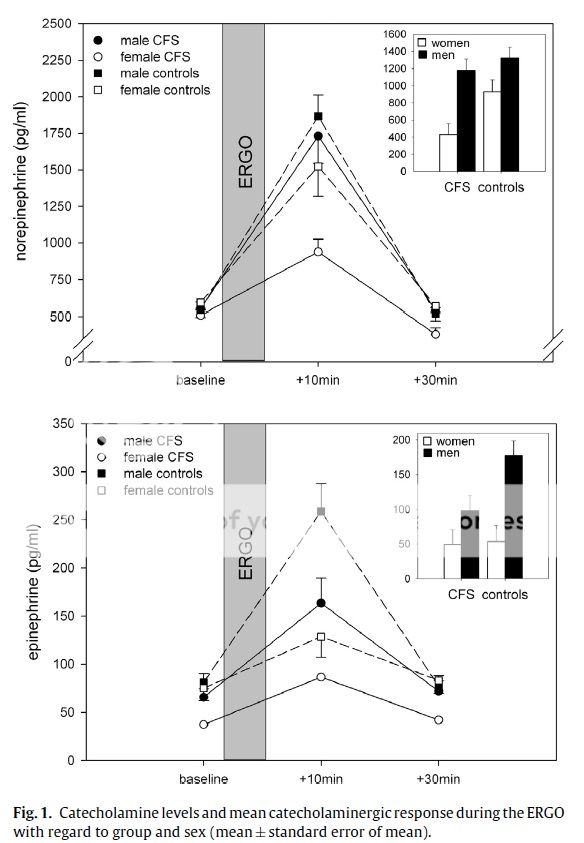Simon
Senior Member
- Messages
- 3,789
- Location
- Monmouth, UK
A novel and very interesting finding that CFS patients have a normal adrenaline response to insulin stress but an abnormal one to exercise. Small study, but intriguing, especially given the link between faulty adrenaline production and fatigue.
Norepinephrine and epinephrine responses to physiological and pharmacological stimulation in chronic fatigue syndrome - Jana Stahler 2013
Highlights
• CFS patients showed diminished catecholaminergic responses to an exercise stressor.
• They showed unaltered catecholaminergic responses to a pharmacological stressor.
• Exercise seems to be an important stressor for CFS patients.
• Inadequate catecholaminergic responses to physical exertion might contribute to CFS symptoms.
Abstract
Chronic fatigue syndrome (CFS) is characterized by fatigue lasting 6 months or longer. CFS has been associated with a disturbed (re-)activity of the autonomic nervous system. However, the sympathetic adrenomedulla (SAM) remains under-examined in CFS.
To investigate SAM reactivity, we implemented a submaximal cycle ergometry (ERGO) and a pharmacological test (Insulin Tolerance Test, ITT) in 21 CFS patients and 20 age-, sex-, and BMI-matched controls. Plasma norepinephrine and epinephrine were collected once before and twice after the tests (+10/+20, and +30 min).
Lower baseline levels and attenuated responses of epinephrine to the ERGO were found in CFS patients compared to controls, while the groups did not differ in their responses to the ITT.
To conclude, we found evidence of altered sympathetic-neural and SAM reactivity in CFS. Exercise stress revealed a subtle catecholaminergic hyporeactivity in CFS patients. It is conceivable that inadequate catecholaminergic responses to physical exertion might contribute to CFS
symptoms.
Trying to access the full text
Making sense of the terminology: adrenaline, norepinepherine, catecholamines etc
This is basically about the 'Fight or Flight' response. Epinepherine is another name for adrenaline, the "Go!" hormone produced by the adrenal glands to kick start the body into action.
Norepinepherine is the same as noradrenaline and is a cousin of adrenaline that is also involved in the flight or flight response, both as a neurotransmitter (signal between nerve cells) and as a hormone (diffusing more widely in the body).
Both adrenaline and noradrenaline are a category of molecule known as catecholamines
Norepinephrine and epinephrine responses to physiological and pharmacological stimulation in chronic fatigue syndrome - Jana Stahler 2013
Highlights
• CFS patients showed diminished catecholaminergic responses to an exercise stressor.
• They showed unaltered catecholaminergic responses to a pharmacological stressor.
• Exercise seems to be an important stressor for CFS patients.
• Inadequate catecholaminergic responses to physical exertion might contribute to CFS symptoms.
Abstract
Chronic fatigue syndrome (CFS) is characterized by fatigue lasting 6 months or longer. CFS has been associated with a disturbed (re-)activity of the autonomic nervous system. However, the sympathetic adrenomedulla (SAM) remains under-examined in CFS.
To investigate SAM reactivity, we implemented a submaximal cycle ergometry (ERGO) and a pharmacological test (Insulin Tolerance Test, ITT) in 21 CFS patients and 20 age-, sex-, and BMI-matched controls. Plasma norepinephrine and epinephrine were collected once before and twice after the tests (+10/+20, and +30 min).
Lower baseline levels and attenuated responses of epinephrine to the ERGO were found in CFS patients compared to controls, while the groups did not differ in their responses to the ITT.
To conclude, we found evidence of altered sympathetic-neural and SAM reactivity in CFS. Exercise stress revealed a subtle catecholaminergic hyporeactivity in CFS patients. It is conceivable that inadequate catecholaminergic responses to physical exertion might contribute to CFS
symptoms.
Trying to access the full text

